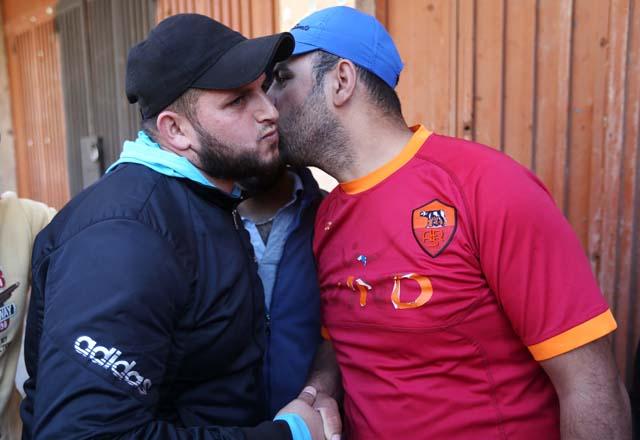You are here
Lebanon army expands operation in restive Tripoli
By AFP - Apr 02,2014 - Last updated at Apr 02,2014

TRIPOLI, Lebanon — Lebanese troops moved into a restive Sunni area in the northern city of Tripoli Wednesday, in the second stage of a plan aimed at quelling deadly Syria-linked violence there, a security source said.
Residents welcomed the deployment, saying they hoped it would help bring normality to the city, and several families displaced by the violence were able to return to their homes.
The move into Bab Al Tebbaneh comes a day after the army entered the neighbouring Alawite district of Jabal Mohsen.
It follows orders from ministers last week for security forces to move into the port city, which has been plagued by violence for months and where at least 30 people were killed in two weeks of fighting in March.
Fighters from the two neighbourhoods have clashed frequently, with decades-old sectarian tensions exacerbated by the war in neighbouring Syria.
Hundreds of people have been killed across the country — including in bomb attacks and battles — since the war in Syria broke out three years ago.
“The Lebanese army completed its deployment into the flashpoint areas [of Tripoli] and army units went into Bab Al Tebbaneh this morning,” said the security source, who spoke to AFP on condition of anonymity.
“The military removed the barricades from the streets and the rooftops, and opened up the road linking Bab Al Tebbaneh to Jabal Mohsen,” he added.
“They conducted raids and searched for weapons and wanted people. The troops were backed by armoured vehicles, tanks and bulldozers,” said the source, without saying whether anyone was arrested.
A security source said “all the commanders on both sides have disappeared. The army has gone to their houses to find them, with no luck.”
Syria dominated Lebanon for nearly 30 years until 2005, and its civil war has divided the Lebanese squarely into two camps — one supporting President Bashar Assad, the other backing the revolt.
In Bab Al Tebbaneh, a semblance of normality returned with shops re-opening on aptly named Syria Street, the road dividing the Sunni neighbourhood from neighbouring Jabal Mohsen.
Syria Street is a commercial road that acts as the makeshift frontline during clashes between the Sunnis, who support the rebellion against Assad, and the Alawites, who back him.
A Sunni sheikh from Bab Al Tebbaneh led a peace march to neighbouring Jabal Mohsen Wednesday morning, saying it was to show “that we are family and this phase of violence is over”.
The 45-year-old father of four, Ayman Kharma, said he hoped the plan would allow his family to begin repairing their home in Syria Street.
“Our house was hit four times by shells. Eventually, it was burned down” in the fighting, he said.
“We had to move out to my wife’s family home. I hope the state pays us compensation, and that we can return and fix our home.”
Bab Al Tebbaneh and Jabal Mohsen both suffer from deep poverty and marginalisation, and many people have said they would not have fought if they had jobs.
“The security plan will only work if it is accompanied by a development plan to rehabilitate this area,” Kharma added.
Ali Fidda, an official of the Arab Democratic Party in Jabal Mohsen, told AFP residents there also welcomed the plan.
“We hope it is a solution that brings an end to the bloodshed in this city,” Fidda said. “The residents welcome any plan that restores security.”
But he also warned that deep divisions in Tripoli and the region would need to be solved in order for a lasting peace to take root.
“In order for true reconciliation to happen, you need the leaders to reconcile their differences first,” said Fidda.
Separately, three rockets launched from Syria hit Labweh, a Hizbollah bastion in eastern Lebanon, a security source told AFP, adding that there were no casualties.
The village has suffered multiple rocket attacks from across the Syrian border, several of which have been claimed by jihadists who support Syria’s revolt.
Related Articles
A firefight between pro- and anti-Damascus factions in Beirut killed one gunman and wounded 13 Sunday, a security official said, in the latest spillover of the conflict in neighbouring Syria.
Twenty-seven people, most of them civilians, have been killed in 12 days of clashes between pro- and anti-Damascus fighters in Lebanon’s second city Tripoli, a security source told AFP Monday.
Ten people have been killed in 48 hours of clashes in Lebanon’s northern town of Tripoli linked to the conflict in neighbouring Syria, a security source told AFP on Saturday.
















